CARE Director Professor Mohan Dutta serves as Advisor to the Center for Adivasi (Indigenous) Research and Development, Odisha. Please join him at this talk organised by CARD on Adivasi (Indigenous) Epistemology, Decolonization, and Climate Change.
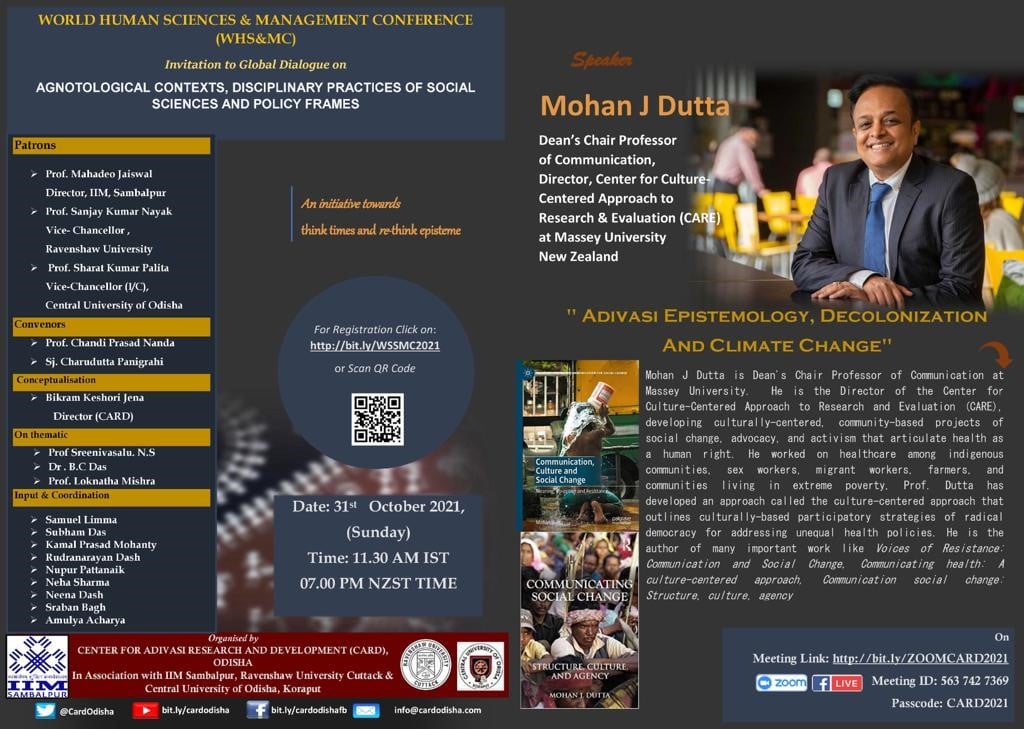
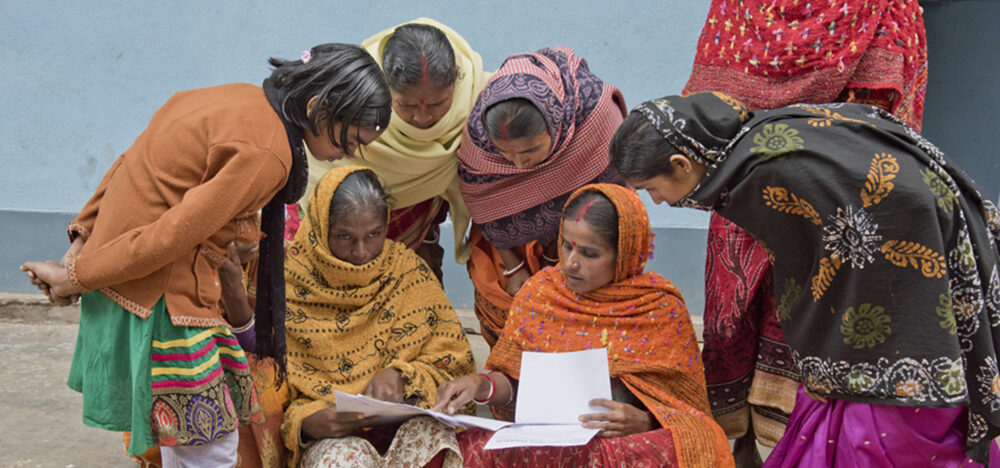
CARE Director Professor Mohan Dutta serves as Advisor to the Center for Adivasi (Indigenous) Research and Development, Odisha. Please join him at this talk organised by CARD on Adivasi (Indigenous) Epistemology, Decolonization, and Climate Change.

CARE is looking forward to this activist-in-residence conversation with Byron Clark. Byron has played an instrumental role in exposing the networks of white supremacy in Aotearoa. We will explore together the collaborations between white supremacy and Hindutva, and strategies for resisting the fascist forces.
Tuesday, 19 October @ 1 pm
CARE in Conversation with Byron Clark and Prof. Mohan Dutta
CARE in Conversation with Byron Clark and Prof. Mohan Dutta
Byron Clark is an activist from Christchurch. For the past two years his work has focused on the reemergence of the far-right and the spread of misinformation online. Much of this activism has taken the form of video essays on YouTube mixing humour with educational content. Clark also has a background in oral history, having recorded an oral history of the ‘Occupy’ protest in Christchurch that took place in 2011 and has written for Fightback, Overland and David Farrier’s Webworm.
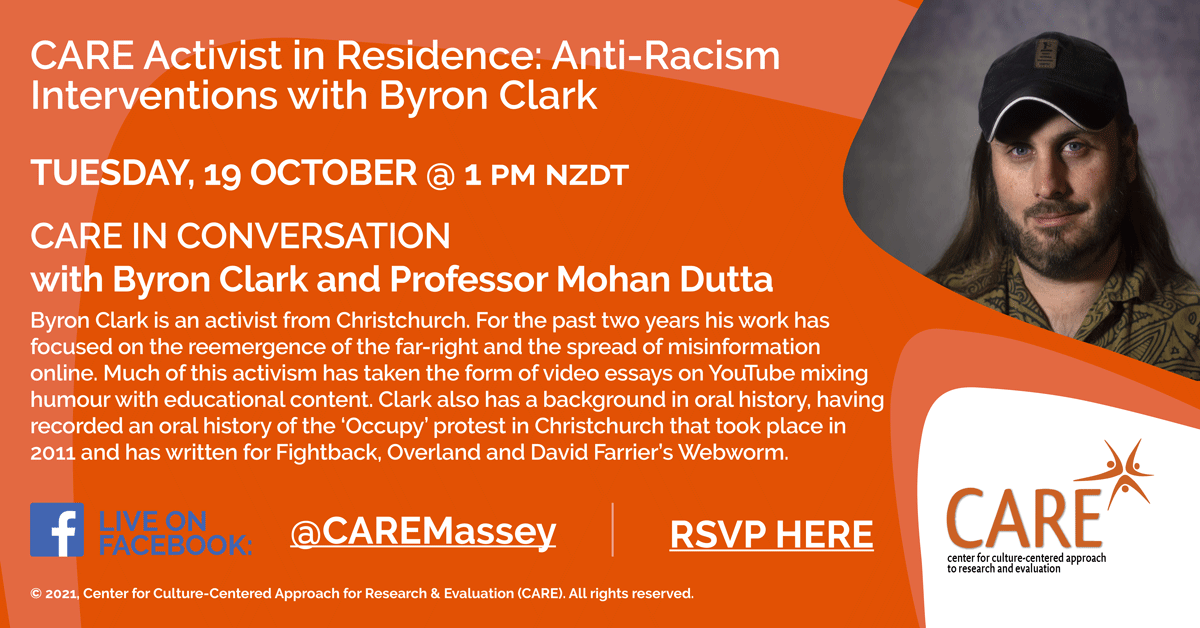
Wednesday, 20 October @ 12 pm
CARE Public Talk – Digital Hate in Aotearoa with Byron Clark
Digital Hate in Aotearoa
Over the past decade the world has watched as movements like the alt-right and Qanon have emerged online, and have in turn affected offline politics. Aotearoa has not been immune to this phenomenon. This talk examines the origins of hate on the internet, and how social media fueled its growth, with a particular focus on the new far-right in Aotearoa.
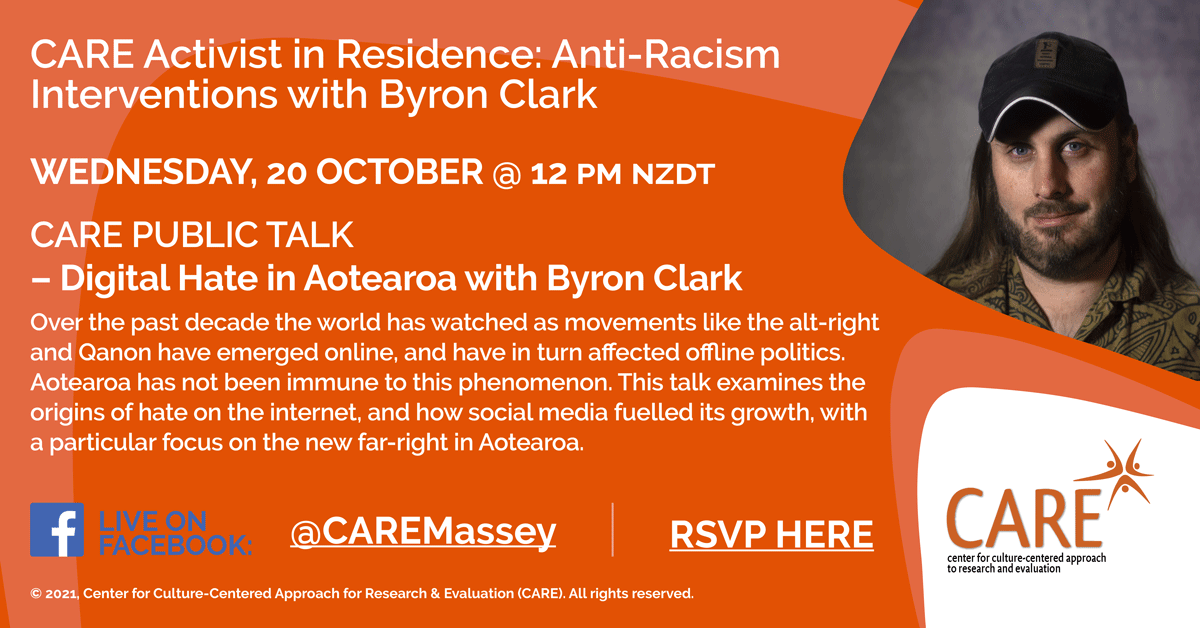
Thursday, 21 October @ 11 am
CARE Workshop – Countering Online Hate and Misinformation with Byron Clark
Countering online hate and misinformation
Everyone has a role to play in countering the spread of hate and misinformation. This workshop demonstrated how to report content to social media platforms as well as utilising institutions like Netsafe and the Broadcasting Standards Authority. It also featured discussion about preventing radicalisation and possibilities for de-radicalisation.
White Paper – Anti-Social Networks: Hate and misinformation online and strategies for responding.
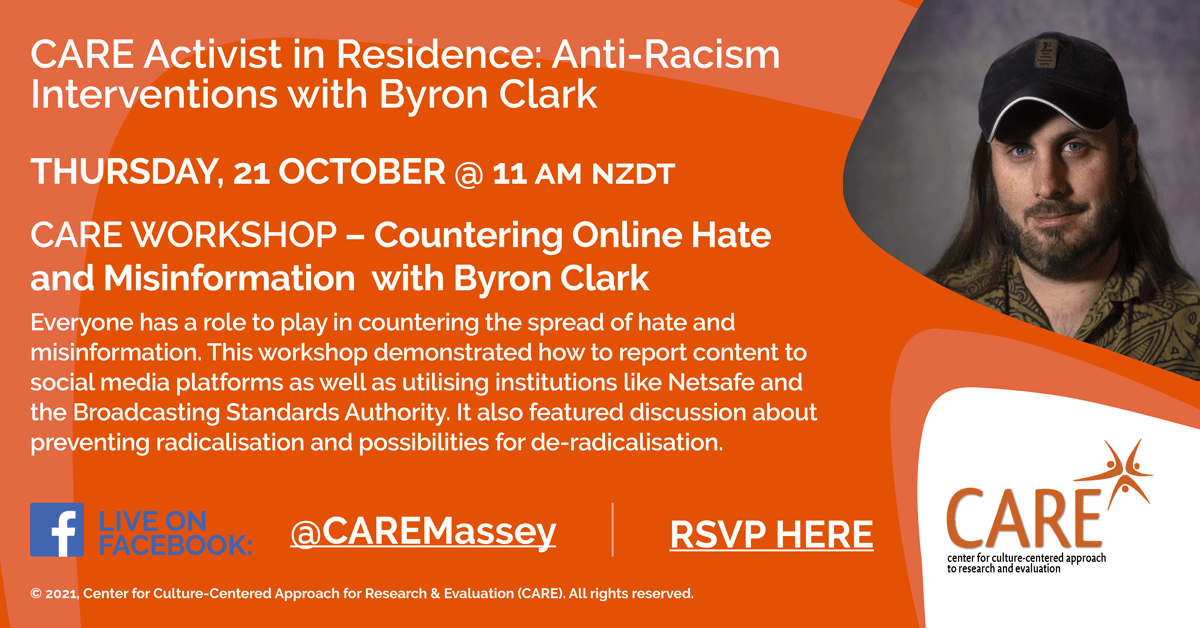
Friday, 22 October @ 10 am
CARE White Paper Launch and Strategies for Responding with Byron Clark and Prof.Mohan Dutta
White Paper – Anti-Social Networks: Hate and misinformation online and strategies for responding.
This paper examines the networks spreading hate and misinformation that have emerged online in Aotearoa in the past few years, and how they have been able to influence mainstream politics despite their small numbers. Ideologies and conspiracy theories from overseas – in particular the United States – have mixed with false narratives that are locally specific. The authors look at strategies for countering these narratives.
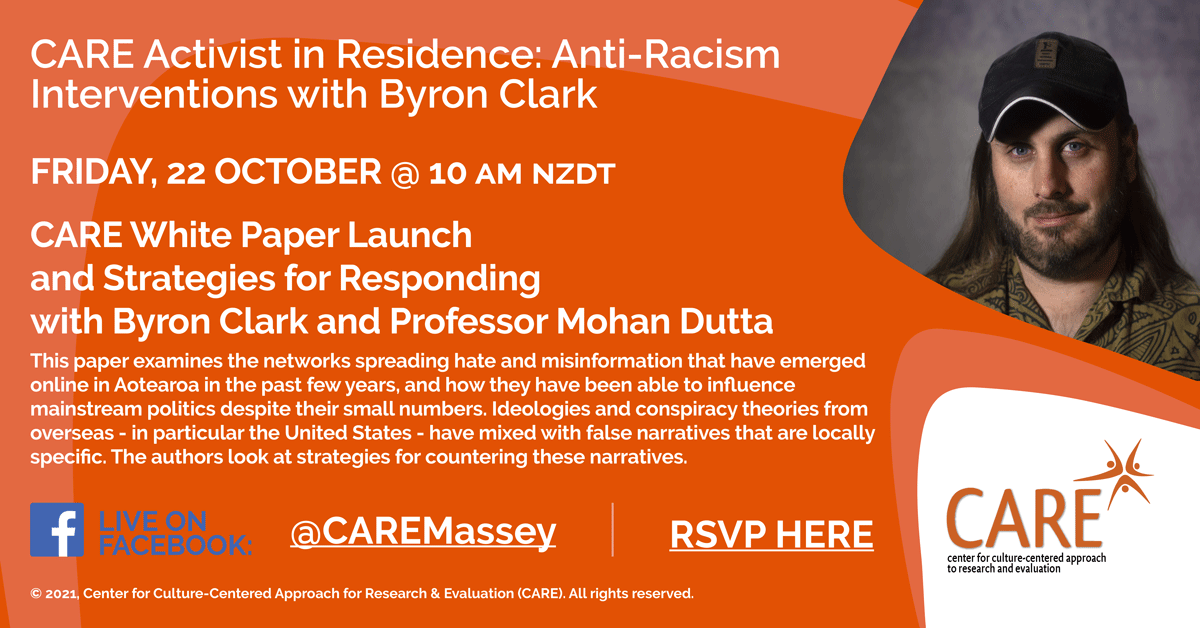
#CAREMassey #CAREMasseyNZ #CARECCA #ActivistInResidence #CAREAIRP #AntiRacism
© 2021, Center for Culture-Centered Approach for Research & Evaluation (CARE). All rights reserved.
CARE PUBLIC TALK- A Strategic Silence: Hindutva Blindness In India’s Security Community with Amit Julka
Thursday, 7th October 2021 @ 9 PM NZDT
Watch the PREMIERE on Facebook @caremassey
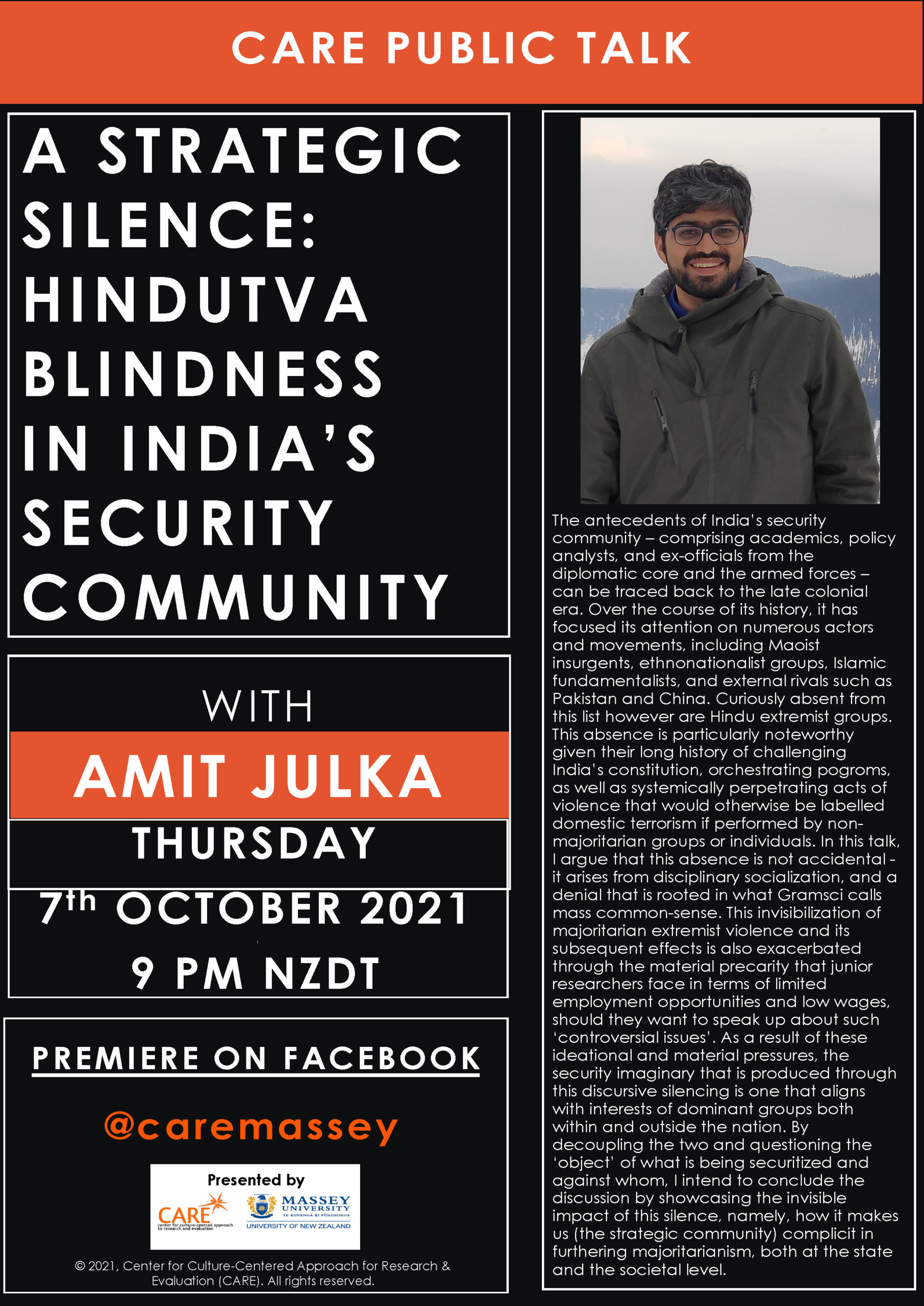
Talk Abstract:
The antecedents of India’s security community – comprising academics, policy analysts, and ex-officials from the diplomatic core and the armed forces – can be traced back to the late colonial era. Over the course of its history, it has focused its attention on numerous actors and movements, including Maoist insurgents, ethnonationalist groups, Islamic fundamentalists, and external rivals such as Pakistan and China. Curiously absent from this list however are Hindu extremist groups. This absence is particularly noteworthy given their long history of challenging India’s constitution, orchestrating pogroms, as well as systemically perpetrating acts of violence that would otherwise be labelled domestic terrorism if performed by non-majoritarian groups or individuals. In this talk, I argue that this absence is not accidental – it arises from disciplinary socialization, and a denial that is rooted in what Gramsci calls mass common-sense. This invisibilization of majoritarian extremist violence and its subsequent effects is also exacerbated through the material precarity that junior researchers face in terms of limited employment opportunities and low wages, should they want to speak up about such ‘controversial issues’. As a result of these ideational and material pressures, the security imaginary that is produced through this discursive silencing is one that aligns with interests of dominant groups both within and outside the nation. By decoupling the two and questioning the ‘object’ of what is being securitized and against whom, I intend to conclude the discussion by showcasing the invisible impact of this silence, namely, how it makes us (the strategic community) complicit in furthering majoritarianism, both at the state and the societal level.
#HindutvaBlindness #India #Hindutva #CAREMassey #MasseyUni
© 2021, Center for Culture-Centered Approach for Research & Evaluation (CARE). All rights reserved
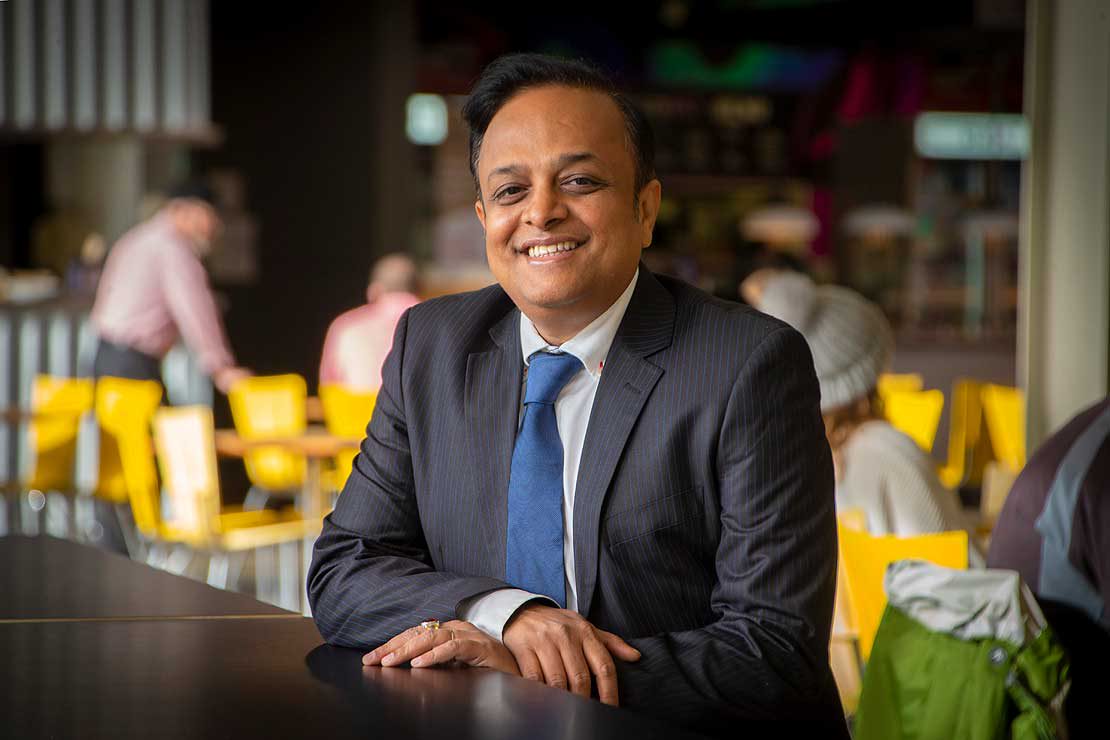
The fascist root of Hindutva is evident in the writings of one of the key architects of the concept, MS Golwalkar, who writes: “German race pride has now become the topic of the day. To keep up the purity of the race and its culture, Germany shocked the world by her purging the country of the Semitic races – the Jews … a good lesson for us in Hindustan to learn and profit by.”
Note here the deep interplays of the ideology of Hindutva and white supremacy. The purity of race and culture that forms the hate structure of white supremacy is mobilised in the political formation of Hindutva. Hindutva embodies the colonial imposition of a politics of purity through the purge of the ‘other’ organised by the state.
One of the key architects of Hindutva, Vinayak Damodar Savarkar, wrote the book Hindutva in 1923, outlining the concepts of a common nation (rashtra), a common race (jati) and a common culture or civilisation (sanskriti). Note the parallels here with the ideology of the German Nazi party, anchored in ein volk(one people), ein reich (one nation), ein Fuhrer (one leader).
At the heart of this ideology is the production of the ‘other’ that is outside of the nation. Similar to the construction of Jews as the outside of ein volk in Nazi ideology, Muslims and Christians are constructed as the outside of the Hindu rashtra in the ideological construction of Hindutva.
The effects of this ideology are evident in the hate and violence that have been directed at Muslims. The ongoing political project of disenfranchising Muslims through the Citizenship Amendment Act (CAA) is a reminder of the Nuremberg Laws passed in Nazi Germany to strip German Jews of their citizenship.
The communicative infrastructure of Hindutva is deployed through the articulation of a monolithic ‘Hinduness’ as the basis for organising the political project. To belong, one has to declare their ‘Hinduness’ and allegiance to the Hindu Rashtra, as defined by the political project of Hindutva.
To dissent from this monolithic vision of Hindutva is to be anti-Hindu. Within the organising structures of India, to dissent against the ideology of Hindutva is to be anti-Indian. The political project of Hindutva threatens the pluralism, polymorphism, and democratic ethos of Hinduism.
The celebrated Indian film-maker Anand Patwardhan, observed at the Dismantling Global Hindutva conference, “If Hindutva is Hinduism, then the Ku Klux Klan is Christianity.”
The recent attacks on me, the Center for Culture-Centered Approach to Research and Evaluation (CARE), Massey University, and on academics globally writing on and debating about the pernicious effects of Hindutva, are reflective of the hegemonic communicative infrastructure of Hindutva. At the heart of this hegemonic infrastructure is the silencing of dissent while imposing a monolithic ideology. In this instance, Hindutva proclaims to speak for all Hindus as it carries out this fundamental attack on academic freedom.
From trolls reproducing digital hate, to hateful propaganda published in diaspora digital portals, to letter writing campaigns targeting the university, to petitions attacking the university for steadfastly supporting academic freedom, forces of Hindutva draw on a wide range of strategies. Hindutva deploys bullying and rhetorical fallacies to silence dissent because it lacks the tools of argumentation to appeal to reason.
Referring to these forces of Hindutva at work to silence academic freedom in the form of the organised attacks on the Dismantling Global Hindutva conference, Professor Gyan Prakash, Dayton-Stockton Professor of History at Princeton University, observes: “The extraordinary thing about the conference was the massive disinformation campaign by those seeking to prevent the academic scrutiny of Hindutva. The campaign launched against this conference was concerted, comprehensive, and entirely without scruples. As has been covered in the Guardian and Al Jazeera, many participants received threats, including death threats. We know that, as a co-sponsoring institution, you also faced overwhelming pressure to pull out from this conference. The threats include nearly every threat to academic freedom listed on the AAUP’s (American Association of University Professors) website.”
Of particular concern in western democracies are the threads of foreign influence and interference into academic freedom and the fabric of pluralism.
In western democracies, Hindutva seeks to silence criticism by communicatively inverting the violence perpetuated by the political ideology of Hindutva, while simultaneously playing to the ethos of superficial western multiculturalism. It projects a narrative of fragility, constructing references to Hinduphobia, in seeking to assert its cultural hegemony in the diaspora, while simultaneously silencing dissent and articulations of social justice. Hindutva actively erases the voices of adivasis (indigenous people), oppressed caste communities, women experiencing gender violence, gender diverse communities, and minority communities in seeking to establish the hegemony of its monolithic values.
In our work at CARE that seeks to co-create spaces for the voices of the ‘margins of the margins’ to be heard, we will continue to pursue our justice-based scholarship in spite of the organised forces of hate seeking to silence these voices by policing the term Hindutva. We are empowered in this work by the steadfast support of the leadership of Massey University in safeguarding our academic freedom, and in the protections offered by the Education Act 1989.
Professor Mohan J. Dutta recognised as Distinguished Scholar
Professor Mohan Dutta named ICA Fellow
Article Source: Massey University News
© 2021, Center for Culture-Centered Approach for Research & Evaluation (CARE). All rights reserved.
by Prof. Mohan Dutta, Massey University

The fascist root of Hindutva is evident in the writings of one of the key architects of the concept, MS Golwalkar, who writes: “German race pride has now become the topic of the day. To keep up the purity of the race and its culture, Germany shocked the world by her purging the country of the Semitic races – the Jews … a good lesson for us in Hindustan to learn and profit by.”
Note here the deep interplays of the ideology of Hindutva and white supremacy. The purity of race and culture that forms the hate structure of white supremacy is mobilised in the political formation of Hindutva. Hindutva embodies the colonial imposition of a politics of purity through the purge of the ‘other’ organised by the state.
One of the key architects of Hindutva, Vinayak Damodar Savarkar, wrote the book Hindutva in 1923, outlining the concepts of a common nation (rashtra), a common race (jati) and a common culture or civilisation (sanskriti). Note the parallels here with the ideology of the German Nazi party, anchored in ein volk(one people), ein reich (one nation), ein Fuhrer (one leader).
At the heart of this ideology is the production of the ‘other’ that is outside of the nation. Similar to the construction of Jews as the outside of ein volk in Nazi ideology, Muslims and Christians are constructed as the outside of the Hindu rashtra in the ideological construction of Hindutva.
The effects of this ideology are evident in the hate and violence that have been directed at Muslims. The ongoing political project of disenfranchising Muslims through the Citizenship Amendment Act (CAA) is a reminder of the Nuremberg Laws passed in Nazi Germany to strip German Jews of their citizenship.
The communicative infrastructure of Hindutva is deployed through the articulation of a monolithic ‘Hinduness’ as the basis for organising the political project. To belong, one has to declare their ‘Hinduness’ and allegiance to the Hindu Rashtra, as defined by the political project of Hindutva.
To dissent from this monolithic vision of Hindutva is to be anti-Hindu. Within the organising structures of India, to dissent against the ideology of Hindutva is to be anti-Indian. The political project of Hindutva threatens the pluralism, polymorphism, and democratic ethos of Hinduism.
The celebrated Indian film-maker Anand Patwardhan, observed at the Dismantling Global Hindutva conference, “If Hindutva is Hinduism, then the Ku Klux Klan is Christianity.”
The recent attacks on me, the Center for Culture-Centered Approach to Research and Evaluation (CARE), Massey University, and on academics globally writing on and debating about the pernicious effects of Hindutva, are reflective of the hegemonic communicative infrastructure of Hindutva. At the heart of this hegemonic infrastructure is the silencing of dissent while imposing a monolithic ideology. In this instance, Hindutva proclaims to speak for all Hindus as it carries out this fundamental attack on academic freedom.
From trolls reproducing digital hate, to hateful propaganda published in diaspora digital portals, to letter writing campaigns targeting the university, to petitions attacking the university for steadfastly supporting academic freedom, forces of Hindutva draw on a wide range of strategies. Hindutva deploys bullying and rhetorical fallacies to silence dissent because it lacks the tools of argumentation to appeal to reason.
Referring to these forces of Hindutva at work to silence academic freedom in the form of the organised attacks on the Dismantling Global Hindutva conference, Professor Gyan Prakash, Dayton-Stockton Professor of History at Princeton University, observes: “The extraordinary thing about the conference was the massive disinformation campaign by those seeking to prevent the academic scrutiny of Hindutva. The campaign launched against this conference was concerted, comprehensive, and entirely without scruples. As has been covered in the Guardian and Al Jazeera, many participants received threats, including death threats. We know that, as a co-sponsoring institution, you also faced overwhelming pressure to pull out from this conference. The threats include nearly every threat to academic freedom listed on the AAUP’s (American Association of University Professors) website.”
Of particular concern in western democracies are the threads of foreign influence and interference into academic freedom and the fabric of pluralism.
In western democracies, Hindutva seeks to silence criticism by communicatively inverting the violence perpetuated by the political ideology of Hindutva, while simultaneously playing to the ethos of superficial western multiculturalism. It projects a narrative of fragility, constructing references to Hinduphobia, in seeking to assert its cultural hegemony in the diaspora, while simultaneously silencing dissent and articulations of social justice. Hindutva actively erases the voices of adivasis (indigenous people), oppressed caste communities, women experiencing gender violence, gender diverse communities, and minority communities in seeking to establish the hegemony of its monolithic values.
In our work at CARE that seeks to co-create spaces for the voices of the ‘margins of the margins’ to be heard, we will continue to pursue our justice-based scholarship in spite of the organised forces of hate seeking to silence these voices by policing the term Hindutva. We are empowered in this work by the steadfast support of the leadership of Massey University in safeguarding our academic freedom, and in the protections offered by the Education Act 1989.
Professor Mohan J. Dutta recognised as Distinguished Scholar
Professor Mohan Dutta named ICA Fellow
Article Source: Massey University News
© 2021, Center for Culture-Centered Approach for Research & Evaluation
(CARE). All rights reserved.